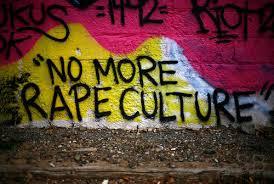 Being introduced to the concept of rape culture changed everything. It changed my understanding of television, music, jokes, laws, and even language. When asked to write a primer for rape culture, I assumed it would be a simple task. Surely, I had been using the term for years, since taking a Women’s Studies 101 course at UNC. It took the better part of a week, however, to even start this overwhelming blog post.
Being introduced to the concept of rape culture changed everything. It changed my understanding of television, music, jokes, laws, and even language. When asked to write a primer for rape culture, I assumed it would be a simple task. Surely, I had been using the term for years, since taking a Women’s Studies 101 course at UNC. It took the better part of a week, however, to even start this overwhelming blog post.
It feels difficult to define something as pervasive as rape culture, but essentially it is a set of attitudes and practices that normalize, tolerate, and even condone sexual violence. We hear messages supporting rape culture everywhere, from television and music to casual comments and jokes from friends. These everyday messages have a deep-rooted impact on society.
Rape culture creates and maintains a hostile environment for survivors. It creates victim blaming and rape myths, which together encourage rapists to rape and discourage survivors from getting help. Rape culture affects all of us, even those who are not directly victimized by sexual violence, by causing all women (and many men) to live in fear of sexual violence. Rape culture affects all of us – men and women – by making it difficult to live outside of strict gender roles that, among other things, perpetually cast men as aggressive perpetrators and women as passive victims.
To use specifics, rape culture is when your friends ask what you were wearing the night of the assault. Rape culture is when you ask yourself if you had too much whiskey when it happened. Rape culture is turning on the radio and hearing Rick Ross say, “Put molly all in her champagne, she ain’t even know it, I took her home and I enjoyed that, she ain’t even know it.” Rape culture is, “…but I/you/she/he didn’t technically say no.” Rape culture is letting your boss talk about the way your body looks in a certain outfit because you want to keep your job. Rape culture is advertisements that objectify women and glorify male aggression. Rape culture is every catcall at 2 am, at 2 pm. Rape culture is pretending to talk on the phone on the walk home from the library at night. Rape culture is, “It’s only rape if…” Rape culture is everywhere, and it’s easy to feel overwhelmed.
Fortunately, there are steps we can all take to fight back against rape culture. For example, don’t support artists or television shows that perpetuate rape culture. Don’t laugh at rape jokes. Learn from the example of other incredible organizations that are creating change and struggling against rape culture. For example, blogs like I Fight Rape Culture Because… encourage individuals to explain the importance of resisting rape culture in their own words. A group of creative activists are working together as FORCE: Upsetting Rape Culture that works on actions like projecting “Rape is Rape” with stories from survivors, or launching a fake Victoria’s Secret “Pink Consent” lingerie campaign. Hollaback is an organization and movement to end street harassment. One last website I would recommend is the inspiring Youth Against Rape Culture (created by our very own Sexual Violence Prevention Task Force) that posts pictures, videos, and stories that demonstrate rebellion against the normalization of rape and sexual violence.
What stands out about these examples of subversion is their grassroots nature. The individuals that make up this work are just like you or me, and they empower us all to fight back.
—
Alex Stewart recently joined the staff as our Administrative Services Coordinator. In addition to managing our office and providing integral staff support, she offers amazing media production skills to the Center.
